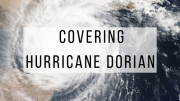Fabian Osorio/Contributing Writer
Hurricane season in South Florida lasts until Nov. 30 and there can be financial and psychological impacts according to FIU professors.
“Students should carry renter’s insurance, if they are renting, to protect their homes and apartment’s contents and property from, among other things, storm winds,” said Professor Shahid Hamid, director of the FIU International Hurricane Research Center’s Laboratory for Insurance, Financial and Economic Research.
Dr. Shahid Hamid is director of the FIU International Hurricane Research Center’s Laboratory for Insurance, Financial and Economic Research. He primarily works with the financial and insurance consequences of hurricanes.
He said it is too late to get any insurance until Hurricane Dorian is over. However, right now students should make sure to use their accordion shutters, if available, and check to see if they close properly.
“If they have renters or homeowner’s insurance, they should take pictures of their home property. Afterwards, if they suffer losses, they should file a claim as soon as possible to get in line,” said Hamid.
He also suggests to only make emergency repairs until the claim adjusters show up, keep all receipts and park their car inside the garage, if they live on campus.
Becky Morel, who studies Digital Communications and Media, recalls a bad experience she had with a hurricane in Miami.
She had not experienced any storm or hurricane on FIU campus, but she vividly remembers when Hurricane Irma was announced in 2017. She had to evacuate with her family the day before the hurricane hit.
“Not knowing how badly the hurricane would affect us and leaving the house was very difficult for us,” said Morel.
She said that the evacuation was fast, but scary; her family did not really know what would come next.
“I was very scared because this was one of the strongest hurricanes that I was finally old enough to be aware of, before this was Hurricane Andrew,” said Morel. “We packed a lot of our prized possessions not knowing how everything would be when we returned.”
Her family traveled 20 miles inland looking for safety.
“We went about 20 miles away from Surfside, where we used to live, toward Broward crossing I-95. We definitely over stocked on food and water, so we were fine on that aspect,” she said.
Morel and her family were financially affected: they spent about $300 on plywood to cover their windows and about $300 on hotel.
This time around, the first thing on Morel’s personal hurricane plan is make sure they have a good stock of nonperishable food and water along with flashlights and phone chargers. The National Hurricane Center recommends to have a reserve of one gallon of water per person, per day.
Morel also makes sure all windows and doors are closed and monitors local news like Channel 7 and weather.com.
Morel is not aware of FIU’s emergency procedures, but she knows that both campuses were providing shelter for those who might need it.
Student of Health Service Administration, Thuy-Thuong Nguyen, who has lived most of her life in Miami, shares Morel’s trauma.
“I remember my family’s car getting flooded during Hurricane Wilma back in 2005. After Wilma left Miami, it was very hard to get around because large trees and debris were everywhere,” said Nguyen. “A lot of Florida residents suffered great damages to their property.”
She is preparing herself for the hurricane by buying water supplies for everyone in her household. She said that buying batteries for flashlights and radio as well as non-perishable food is very important.
Nguyen listens to local news and watches CNN to keep track of the hurricane path. She also visits the FIU Department of Emergency Management website to look for information on how to better prepare for the hurricane season.
Dr. Richard S. Olson, professor and Extreme Event Institute director at FIU, researches the political fallout from natural disasters and has been involved in more than 20 field responses and post-disaster investigations.
He advises FIU students in terms of safety preparation for Hurricane Dorian that may impact our area later this weekend.
“Have basic supplies and a plan, particularly if there are any sudden changes in the track or characteristics of the storm,” he said. “Stay vigilant, be aware of NHC advisories on any changes in Dorian’s size, track and intensity. Pay close attention to emergency management instructions.”
He suggests avoiding rumors. Most people depend upon social media and are vulnerable to fast-spreading rumors, according to Olson.
He says that when it comes to weather, students can trust the National Hurricane Center or tune in the Weather Channel. For local guidance, they can google Miami-Dade Emergency Management or tune in one of the local TV channels.
“FIU students should certainly follow the advice that are being broadcast: stock up on food, water, medicine (if prescribed), evacuate to shelter if so advised by the County. If living on campus, follow the instructions of university officials and move to designated shelters on campus when told to do so,” Hamid said.





Be the first to comment on "Psychological and Financial Impact of the Hurricane Season"